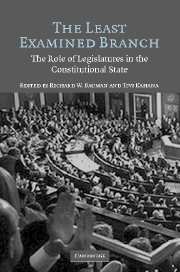Book contents
- Frontmatter
- Contents
- Foreword: Legislatures in the Constitutional State by Amy Gutmann
- Contributors
- New Ways of Looking at Old Institutions
- PART ONE LEGISLATURES AND DEMOCRATIC THEORY
- PART TWO LEGISLATING AND DELIBERATING IN THE DEMOCRATIC LEGISLATURE
- PART THREE CONSTITUTION MAKING BY LEGISLATURES: THE EXPLICIT VERSION
- PART FOUR CONSTITUTION MAKING BY LEGISLATURES: THE IMPLICIT VERSION
- PART FIVE CONSTITUTIONAL INTERPRETATION AND APPLICATION BY THE LEGISLATURE
- PART SIX IS LEGISLATIVE CONSTITUTIONALISM POSSIBLE?
- PART SEVEN THE LEGISLATURE IN DIALOGUE: DOMESTIC AND INTERNATIONAL CONTEXTS
- 25 Disobeying Parliament? Privative Clauses and the Rule of Law
- 26 Look Who's Talking Now: Dialogue Theory and the Return to Democracy
- 27 An International Community of Legislatures?
- 28 Legislatures in Dialogue with One Another: Dissent, Decisions, and the Global Polity
- Index
27 - An International Community of Legislatures?
Published online by Cambridge University Press: 06 August 2009
- Frontmatter
- Contents
- Foreword: Legislatures in the Constitutional State by Amy Gutmann
- Contributors
- New Ways of Looking at Old Institutions
- PART ONE LEGISLATURES AND DEMOCRATIC THEORY
- PART TWO LEGISLATING AND DELIBERATING IN THE DEMOCRATIC LEGISLATURE
- PART THREE CONSTITUTION MAKING BY LEGISLATURES: THE EXPLICIT VERSION
- PART FOUR CONSTITUTION MAKING BY LEGISLATURES: THE IMPLICIT VERSION
- PART FIVE CONSTITUTIONAL INTERPRETATION AND APPLICATION BY THE LEGISLATURE
- PART SIX IS LEGISLATIVE CONSTITUTIONALISM POSSIBLE?
- PART SEVEN THE LEGISLATURE IN DIALOGUE: DOMESTIC AND INTERNATIONAL CONTEXTS
- 25 Disobeying Parliament? Privative Clauses and the Rule of Law
- 26 Look Who's Talking Now: Dialogue Theory and the Return to Democracy
- 27 An International Community of Legislatures?
- 28 Legislatures in Dialogue with One Another: Dissent, Decisions, and the Global Polity
- Index
Summary
LEGAL TRANSPLANTS AND LEGISLATION
Learning from other legal systems has always been a significant technique for developing law. Legal historian Alan Watson described this mode of development as “legal transplants,” a term that he coined for this purpose. According to Watson, “at most times, in most places, borrowing from a different jurisdiction has been the principal way in which law has developed.” Instances of this mode of legal development can be found from the beginning of documented history, as evident in the presence of similar laws in various codes in use in the ancient Near East.
Most of the literature dealing with the technique of legal transplants deals with the desirability of this practice. Some, like Watson, saw only the positive and useful aspects of learning from other countries. Others, like Otto Kahn-Freund, have cautioned against the indiscriminate adoption of legal institutions or ideas that do not fit the conditions of the importing system. Much earlier, Montesquieu had argued that the laws of a nation reflect its spirit and, therefore, cannot suit other communities. This chapter pursues a different course. Rather than asking whether importing concepts from foreign law is a desirable practice, it looks more closely at the legal institutions and procedures involved in the implementation of such concepts. More specifically, this chapter focuses on the role of legislatures in the adoption of models and ideas from foreign statutes.
- Type
- Chapter
- Information
- The Least Examined BranchThe Role of Legislatures in the Constitutional State, pp. 532 - 546Publisher: Cambridge University PressPrint publication year: 2006
- 3
- Cited by



